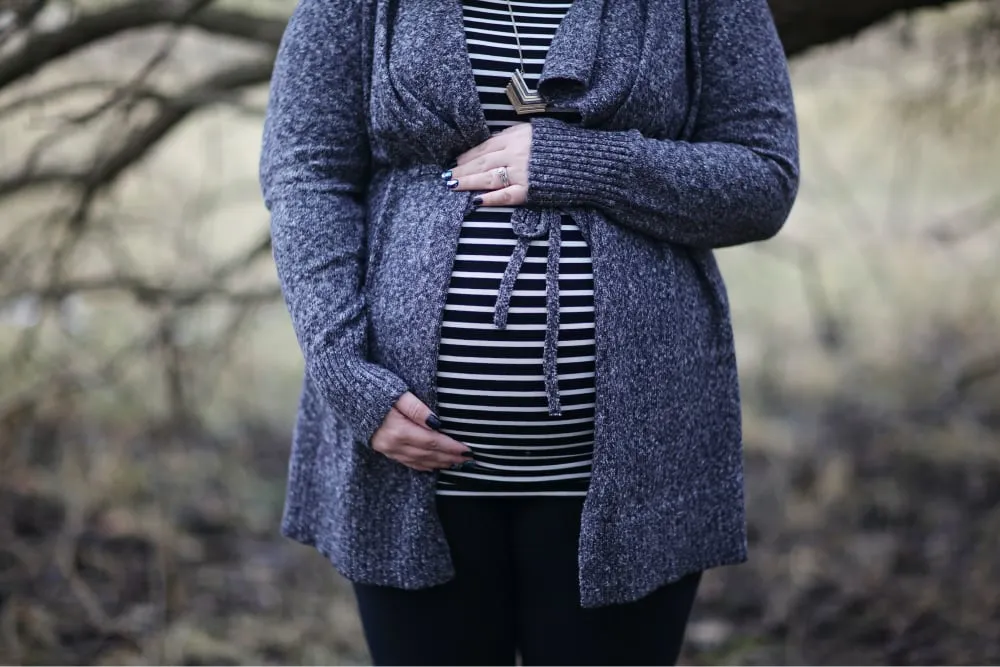What is pregorexia?
"Pregorexia" is not an official medical term. Instead, it's used to describe the phenomenon of people struggling with disordered eating behaviors or full-blown eating disorders while pregnant.
"Pregorexia" can take many forms, including limiting food intake while pregnant or using other behaviors, like laxative misuse or excessive exercise, in an attempt to lose weight or control pregnancy weight gain. The condition also frequently includes body image struggles, especially as pregnancy-related weight gain begins to set in.
The hormonal shifts of pregnancy can lead to the development of disordered eating behavior, as well. Some research has found that pregnancy may trigger binge eating disorder in certain individuals.5
Discussion on the topic is still relatively new, and much research is still needed to better understand pregorexia. For example, it's unclear whether people who previously experienced eating disorders are at a higher risk of developing pregorexia.3 Regardless, struggling with food-related issues during pregnancy can contribute to complications like low birth weight and potentially bring on other medical concerns for both baby and mother.
Types of pregorexia treatment
As "pregorexia" is not officially defined and is still being explored, there are no "official" treatments for pregnancy-related eating disorders. However, many of the therapies that have been used for eating disorders could also help pregnant women develop healthier food habits and thoughts about their body weight and body image.
For example, psychotherapy, or talk therapy, is often the first-line treatment for eating disorders of any type. And other approaches, like nutritional counseling and meal monitoring, can also be beneficial.
A doctor may advise a patient to undergo one or several of these treatment types to best address the condition.
Cognitive behavioral therapy
Cognitive behavioral therapy (CBT) is the most common therapeutic approach for eating disorders of all varieties. The concept revolves around the thought that unhelpful actions come from unhelpful thoughts and works to help patients learn to recognize—and, eventually, change—these destructive patterns.
Someone with a pregnancy-related eating disorder may use CBT to explore the underlying triggers for their eating behavior. They may find the issue stems from a lack of control over their changing body or a compulsive nature to regulate what they eat. Once they understand where these thoughts are coming from, they can work on implementing change.
Interpersonal psychotherapy
Interpersonal psychotherapy (IPT) is used in many situations and is seen as an especially helpful form of therapy for those going through significant life changes.
1 This can make it particularly helpful for those struggling with eating disorder behaviors while pregnant.
The practice helps teach patients how to better manage their interpersonal relationships through boundary setting, clear communication, and other skills. It's often thought that this can help naturally improve self-esteem and create better social environments for someone to step away from disordered thoughts and behaviors.
Exposure therapy
Exposure therapy is sometimes used to combat eating disorders and has been found especially helpful with anorexia nervosa.
2 If a mother-to-be struggled with anorexia nervosa before pregnancy and/or actively works against weight gain during pregnancy, they may benefit from this technique.
In many cases, food restriction revolves around the fear or anxiety of gaining weight. Exposure therapy encourages patients to confront foods they find triggering and see that eating and potentially gaining weight is okay. For pregnant people, this outlook may become essential for the healthy development of their unborn child.
Group therapy
Eating disorders can make people feel like they're bad and that no one can understand their pain or position. When someone is pregnant and struggling with these thoughts and behaviors, there can be additional guilt and shame, which may cause them to self-isolate even further.
Group therapy is a way to confront these thoughts by expressing them openly. These sessions involve people going through similar situations. Together, the group learns about their conditions and can practice new, healthier coping mechanisms and skills. Group therapy can also provide insight into dealing with the inevitable body changes that come with pregnancy and the transition into motherhood for mothers-to-be.
Nutrition counseling and meal support
Proper nutrition is vital for the development of a child during pregnancy. For example, pregnant people require different amounts of nutrients, such as iron, calcium, and vitamin D, to ensure the health of their baby.
4These changing needs can be complicated, even for someone who does not struggle with food and body image issues. With the help of a
nutritional counselor, someone dealing with pregorexia learns more about what they and their child need to be healthy and develop strategies or skills to ensure their nutritional needs are being met. A nutritional counselor may also help someone establish a meal plan or prepare them for the physical changes that still lie ahead.
Levels of care for pregorexia treatment
Every eating disorder needs to be treated, but the level of treatment may vary from case to case, depending on the severity of the disorder, how long someone has been struggling, and other factors connected to their medical history or current needs.
Different levels of care have been developed to help serve people at all levels of recovery.
Inpatient treatment
The most intensive level of care, inpatient treatment, involves 24-hour care at a hospital or treatment center. If a person is experiencing life-threatening complications during pregnancy or childbirth, a medical professional may suggest inpatient treatment.
Inpatient treatment is generally reserved for the most extreme cases when the lives of a pregnant person or their unborn baby are in danger. These stays are often short, lasting until a patient is considered medically stable enough to move on to other types of care.
Residential treatment
Like inpatient treatment, residential care involves 24-hour access to medical personnel. However, these programs generally take place in a home-like environment instead of a hospital. This is because they are more focused on long-term recovery.
Once considered medically stable, patients can enter a residential treatment program. While there, they undergo various types of psychotherapy, group therapy, nutritional counseling, medical check-ins, and other types of care to ensure they're well on the road to recovery.
For someone who's farther along in pregnancy, this may not be an optimal choice, as these programs can be quite restrictive and often last 30 days or longer.
Partial hospitalization program
Partial hospitalization programs (PHPs) are also intensive forms of care, but they allow patients to commute to treatment sessions while living at home. Still, during a PHP, a patient will go to treatment most days of the week, and sessions can, and generally do, last most of the day.
PHPs offer most of the same care options available in a residential program. Still, this level of care is more flexible than a live-in program, so it may be the preferred method for pregnant women who will likely have to deal with other medical and social responsibilities related to their pregnancy.
Intensive outpatient (IOP)
Intensive outpatient treatment (IOP) is somewhere between PHP and outpatient care. In these programs, patients attend treatment several days a week, and sessions may last several hours at a time. Otherwise, they live at home and are generally considered to be at a point where they can continue recovery efforts while taking on more social responsibilities.
For pregnant people and others who struggle with eating disorders, IOPs are good options when someone is ready and able to live at home but could still benefit from more structured care. However, these programs may also make it easier for pregnant women to prepare for their upcoming child and attend all relevant doctor's appointments.
Outpatient
Outpatient treatment is the least intensive form of eating disorder care. At this point, patients live fully at home and participate in their usual routine while maintaining regular check-ins with a treatment team member—usually weekly therapy sessions. For this reason, it's important that patients generally have their disordered thoughts and behaviors under control before going to outpatient care.
Outpatient therapy can be helpful before someone gives birth, but many individuals choose to continue this treatment afterward to help with potential postnatal issues and continue to monitor for triggers once a baby has been born. Outpatient treatment can last anywhere from a few weeks to years. Some people may even choose to continue outpatient therapy indefinitely.
Treating pregnancy-related eating disorders at Within Health
Within Health provides a revolutionary way for mothers-to-be to receive professional care for a pregnancy-related eating disorder at home. The experts at Within Health know each person has a unique healing journey and does not follow formulaic treatment. Instead, they personalize each person's treatment to meet the needs of the individual.
Within Health offers PHP, IOP, and OP treatment that promotes inclusivity no matter the individual's shape, size, ethnicity, gender expression, sexuality, or background. Call our team today to start the journey to recovery.























































